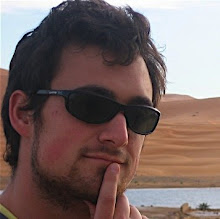We left Antigua on a chicken bus bound for Guatemala City--notorious, even amongst hardy travelers, as a dirty and dangerous place. We hopped off the bus somewhere along a busy highway, as we had been advised, and hopped into a taxi driven by Milton, a former computational math teacher turned taxista. Despite his best efforts to screw us we had been advised of the going rates and was able to get what we wanted. Turned out to be a great, thoughtful guy and of course gave me his number in case I ever "dropped by" Guatemala City in the future. He dropped us off on a dirty chaotic street in front of a dirty chaotic hole-in-the-wall bus station. Inside we paid for tickets to El Salvador and dropped our bags to go exploring for a bit. Central Guatemala City is crazy. Stores, food carts, people, trash, animals, trucks, smog...all heaped right on top of each other like a living, moving collage. People were absolutely gobsmacked, to steal a term from my Irish mate Ciaran, that three "gringos" were just walking around, eating and scoping things out.
The bus to El Salvador was great. The border crossing was easy: quickly stamped with no fees and no trouble. Hordes of food vendors boarded on the Salvadoran side and we got our first taste of pupusas, the national dish. We made friends with people around us including a heavy-machine operator just returned from an 8-month trip to Australia and a freshly graduated doctor from San Salvador. We had intended to stop at a small town just across the border, famous for its weekend food fair, but were convinced by the young doctor, Gonzalo, to continue on to San Salvador.
We found, to our complete surprise, that we had inadvertently stumbled upon a truly historic moment. The presidential election was to be held two days away, on Sunday, and it was widely expected that the leftist FMLN would end their rivals' 20+ year reign. The sale of alcohol was to be cut off nationwide from midnight Friday to midnight Monday, so early Friday was supposed to be a big party and Gonzalo offered to take us out.
The machine operator, Carlos, rocked my world with his story. He had been in Australia visiting his brother and sister, who had emigrated there during El Salvador's 12-year civil war. Apparently hundreds of thousands of Salvadorans ended up in Australia as part of a refugee program (also, 2 million out of 7 million Salvadorans live in the U.S.) He himself had fled earlier to Mexico City--he was in danger, as were many, because he refused to pick sides in the war. For a period of several years, he had no contact with his family and they thought he had been "disappeared" by the government. After a glorious reunion and his trip to Australia, he is now trying to relocate there with his own family.
Our first night in the city, Jaime and Ciaran were attacked a couple blocks from our hostel. Upon realizing the attackers did not have knives, they fought them off and escaped more or less unharmed, but shaken up.
As far as tourist attractions go, there is not much to see in San Salvador, but what we saw was remarkable. We saw a city that, despite its reputation as dangerous and worth missing, embodied a friendliness that boggled the mind. In conversation we told locals about the mugging and they invariable apologized. I think, despite the inexcusable violence, we all recognized that the attack was one of opportunity--two drunk guys, clearly not familiar with the place, walked by three drunk guys who "owned" the place--and did not represent a pattern of violence endemic to the city or country. At every turn we met people fully willing to welcome us into their daily lives, whether it be on the street, in the market, or at the celebration of an historic victory. More to come on the elections, but this section of the travelogue ends here.
Wednesday, March 18, 2009
Subscribe to:
Post Comments (Atom)




No comments:
Post a Comment